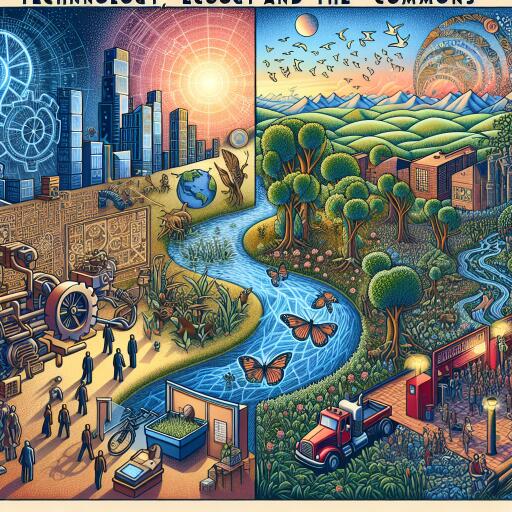
Exploring the Crossroads of Technology, Ecology, and Social Change: A Critical Analysis
In recent debates surrounding the adaptation of Marxist theory to address the pressing ecological crises of our time, two prominent voices stand out for their staunch defense of a traditional Marxist approach. Their critique of emerging theories, particularly those advocating for ‘degrowth communism,’ suggests a resistance to diverging from Marxist orthodoxy amidst global ecological upheaval and social fragmentation. This approach, while rooted in the rich soil of Marxist theory, raises questions about its applicability and responsiveness to contemporary challenges.
Technology: A Double-Edged Sword
At the heart of the discussion is a long-standing belief within Marxist thought that capitalism, with all its faults, is a necessary precursor to a technologically advanced socialist society. Critics argue that the reliance on capitalist modes of technological innovation overlooks the nuanced realities of these advancements. While capitalism has indeed spurred significant technological progress, it has done so selectively—prioritizing profitability over societal benefit. The notion that capitalist technological developments align perfectly with the needs of a future socialist society is, at best, a fortuitous coincidence.
The critical discourse contrasts sharply with the nuanced perspectives of technology’s role in society. Instead of embracing a binary view—where technology is either championed without reservation or dismissed as inherently detrimental—there’s a rich terrain of intermediate, human-scale technologies that deserves exploration. Such technologies offer potential for more equitable, sustainable forms of social organization, challenging the promethean optimism of unchecked technological advancement.
Ecology: Beyond Human Centrism
The ecological viewpoint of the discussed authors brings to light a stark anthropocentrism, viewing ecological crises primarily through the lens of human impact and neglecting the intrinsic value of non-human life. This approach undermines the broader understanding of ecology as the study of living organisms and their environments. By reducing ecological concerns to their effects on human society, it misses the complexity and interconnectedness of Earth’s ecosystems.
This standpoint also sidesteps critical ecological concepts such as balance, resilience, and interdependence, opting instead for a narrative of constant dynamic change that justifies human exploitation of the planet. Such a perspective fails to engage with the philosophical and ethical dimensions of our relationship with the natural world, opting for a dominion over nature rather than a symbiotic existence.
The Commons: Reimagining Collective Existence
The critique extends to the concept of the commons, which is dismissed by some as outdated or ineffectual. Contrary to this view, the commons encompasses a critical component of human survival and socio-ecological resilience. It represents a vast array of shared resources crucial for the livelihoods of billions globally. The dismissal of the commons and related practices as mere ‘buzzwords’ overlooks their deep historical roots and their relevance in contemporary struggles for ecological sustainability and social justice.
The debate about the role of trade unions and cooperatives in advancing socio-ecological transformation reveals a false dichotomy. Both can serve as vital mechanisms for democratic control and sustainable living. Examples from around the world, such as the Mondragon cooperative network and the Earthworker cooperative initiative, demonstrate the potential for cooperatives to provide meaningful employment and contribute to a more democratic and ecological economy.
Conclusion
The critique of a strictly orthodox Marxist approach to tackling ecological crises highlights the need for a more flexible, nuanced understanding of technology, ecology, and collective action. As we navigate the challenges of the Anthropocene, it’s imperative that we explore alternative visions that recognize the limits of technological solutions, honor our deep interconnection with the natural world, and embrace the transformative potential of the commons and cooperative enterprises. In doing so, we can forge pathways toward a more just and sustainable future for all inhabitants of our planet.





Leave a Reply